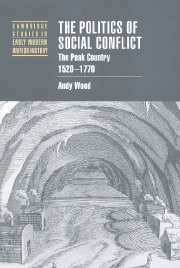Book contents
- Frontmatter
- Contents
- List of figures
- List of tables
- List of maps
- Preface
- List of abbreviations
- Introduction ‘Terms we did not understand’: landscape, place and perceptions
- 1 Social relations and popular culture in early modern England
- Part I The structures of inequality
- 2 Economy and society in the Peak Country, c. 1520–1570
- 3 Industrialization and social change, c. 1570–1660
- 4 The Peak Country as an industrial region, c. 1660–1770
- 5 Social conflict and early capitalism
- Part II The conditions of community
- Part III The politics of social conflict
- Bibliography
- Index
- Cambridge Studies in Early Modern British History
5 - Social conflict and early capitalism
Published online by Cambridge University Press: 27 July 2009
- Frontmatter
- Contents
- List of figures
- List of tables
- List of maps
- Preface
- List of abbreviations
- Introduction ‘Terms we did not understand’: landscape, place and perceptions
- 1 Social relations and popular culture in early modern England
- Part I The structures of inequality
- 2 Economy and society in the Peak Country, c. 1520–1570
- 3 Industrialization and social change, c. 1570–1660
- 4 The Peak Country as an industrial region, c. 1660–1770
- 5 Social conflict and early capitalism
- Part II The conditions of community
- Part III The politics of social conflict
- Bibliography
- Index
- Cambridge Studies in Early Modern British History
Summary
THE PEAK COUNTRY AND THE INDUSTRIAL REVOLUTION
The study of economic and social history does not always benefit from the identification of clear moments of discontinuity. Such moments are often inventions of historians, keen to find disjunctures where the sources imply only seamless continuity. None the less, such moments do occur. We have seen how the introduction of Humphrey's new technology in the 1570s forced one such transformation. A more protracted, but still visible, period of decisive change started to take form at around 1770. And just as with the moment of technological breakthrough some two centuries earlier, its implications were only to be only realized some two decades later. After 1763, enclosure acts concerning the Peak Country started to pass through parliament. Slowly at first, but with gathering force in the years of the French Wars, what survived of the Peak's commons were enclosed, and remaining common rights extinguished. In spite of long-standing piecemeal enclosure by tenants and cottagers, and the much larger post-Restoration enclosures, many commons still provided vital resources to poor inhabitants in the form of pasture, foodstuffs, fuel and building materials. But with parliamentary enclosure, the long movement towards the privatization of communal land and the commodification of collective rights was completed. As always, the local chronology of enclosure was subject to variation. But taken as a whole, the period of parliamentary enclosure spanned some two generations, and gathered in intensity over time. In legislation of the 1760s, cottages of less than twenty years were removed.
- Type
- Chapter
- Information
- The Politics of Social ConflictThe Peak Country, 1520–1770, pp. 113 - 124Publisher: Cambridge University PressPrint publication year: 1999



